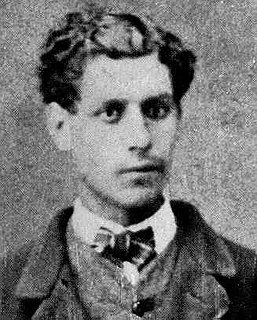A Quote by Immanuel Kant
By a lie a man throws away and, as it were, annihilates his dignity as a man. A man who himself does not believe what he tells another ... has even less worth than if he were a mere thing. ... makes himself a mere deceptive appearance of man, not man himself.
Related Quotes
Savings represent much more than mere money value. They are the proof that the saver is worth something in himself. Any fool can waste; any fool can muddle; but it takes something more of a man to save and the more he saves the more of a man he makes of himself. Waste and extravagance unsettle a man's mind for every crisis; thrift, which means some form of self-restraint, steadies it.
I believe that the unity of man as opposed to other living things derives from the fact that man is the conscious life of himself. Man is conscious of himself, of his future, which is
death, of his smallness, of his impotence; he is aware of others as others; man is in nature, subject to its laws even if he transcends it with his thought.
Solitude is the profoundest fact of the human condition. Man is the only being who knows he is alone, and the only one who seeks out another. His nature - if that word can be used in reference to man, who has ‘invented’ himself by saying ‘no’ to nature - consists in his longing to realize himself in another. Man is nostalgia and a search for communion. Therefore, when he is aware of himself he is aware of his lack of another, that is, of his solitude.
Degrees of ability vary, but the basic principle remains the same: the degree of a man's independence, initiative and personal love for his work determines his talent as a worker and his worth as a man. Independence is the only gauge of human virtue and value. What a man is and makes of himself; not what he has or hasn't done for others. There is no substitute for personal dignity. There is no standard of personal dignity except independence.
The man who is meek is not even sensitive about himself. He is not always watching himself and his own interests. He is not always on the defensive… To be truly meek means we no longer protect ourselves, because we see there is nothing worth defending… The man who is truly meek never pities himself, he is never sorry for himself. He never talks to himself and says, “You are having a hard time, how unkind these people are not to understand you.
There is no deception on the part of the woman, where a man bewilders himself: if he deludes his own wits, I can certainly acquit the women. Whatever man allows his mind to dwell upon the imprint his imagination has foolishly taken of women, is fanning the flames within himself -- and, since the woman knows nothing about it, she is not to blame. For if a man incites himself to drown, and will not restrain himself, it is not the water's fault.
No man can expect to find a friend without faults; nor can he propose himself to be so to another. Without reciprocal mildness and temperance there can be no continuance of friendship. Every man will have something to do for his friend, and something to bear with in him. The sober man only can do the first; and for the latter, patience is requisite. It is better for a man to depend on himself, than to be annoyed with either a madman or a fool.
When a man really gives up trying to make something out of himself - a saint, or a converted sinner, or a churchman (a so-called clerical somebody), a righteous or unrighteous man,...and throws himself into the arms of God...then he wakes with Christ in Gethsemane. That is faith, that is metanoia and it is thus that he becomes a man and Christian.








































